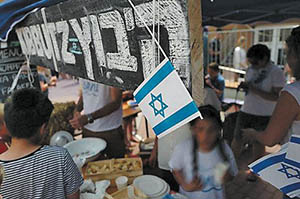
Dor Asraf and Barak Krips open restaurant to build a bridge between Germans and Israel.
Germans are once again flocking to the kibbutz. Without getting on a plane, or even visiting Israel, they frequent a place where words like ‘camaraderie’ and ‘cooperation’ are again commonly used. Here, at an Israeli restaurant in the heart of Berlin, they rediscover the virtues of communal collaboration, while being paid with a different currency—hummus.
“The food is our means to a goal,” explained one of the founders, Barak Krips (26), the founder of “Der Kibbuz,” which opened in April. “We want to create a bridge between Israelis living here and this society, first through food, and then by working together and contributing to our surrounding.”
Two years after leaving Tel Aviv for Berlin, he and his now-husband Dor Asraf-Krips (24) decided to open a hummus restaurant. Neither of them had any formal culinary experience. “I used to work on TV production back in Israel and Dor wanted to study architecture,” told Barak. They settled first in Munich, working odd jobs and learning German.
“At some point we realized that we weren’t born here and we didn’t yet have professions, so maybe the answer was to go into business for ourselves,” he recalled.
Unlike other community projects founded in Berlin by Israelis, including a Hebrew-language library and even a choir, the two decided from the very beginning not to exclude the locals. There is no Hebrew writing on the walls, and with the exception of a rainbow-colored Israeli flag, the decor is free of national symbols.
Even the name chosen for the place represents one of the few concepts which historically bind Israelis and Germans together, without the guilt. “Tens of thousands of Germans have volunteered in the Israeli kibbutzim since the 60s. The kibbutz has almost the same meaning to Germans that it has to us,” insisted Barak. “It’s the connection to nature and to each other, it’s a larger concept which belongs to everyone.”
While the rural aspect of kibbutz life was translated into a menu of fresh vegetarian dishes prepared just before the place opens its doors every morning, the community component of the kibbutz was turned into a series of events: bingo nights, movie screenings and events where Germans and Israelis (but not only) engage in language tuition exchanges over a steaming pan of shakshuka.
“Of course we feel we have a special obligation to Israelis, but we want to help all newcomers to Berlin to acclimatize and to connect to German society,” explained Dor. “This also includes hosting professionals who can help them with all the bureaucracy and with learning the language.”
They hope that these events and the regular encounters between Germans and the new Berliners will form a core of “kibbutz members” who can be recruited for various causes, with the promise of the satisfaction of doing good. Alongside a plate of hummus, of course.
“We already donate food to a daycare center nearby for underprivileged children,” said Barak. “Now we want to arrange activities there, to send our volunteers to play with the kids and help them do their homework, or even to paint the facilities because the people working there don’t have the time or the resources for this.”
“It won’t stop there,” he assured. “We also plan to take on projects like restoring gardens in the neighborhood and so on. Once you are committed to helping your community and the city you live in, the opportunities will present themselves. Israelis in Berlin are already a potential major force, which just needs to be tapped into, and it’s great that not everything is financially motivated.”
One of those people already working for hummus is Maya Waechter, an experienced German teacher who comes every Wednesday to “Der Kibbuz” as a tutor for those still struggling with the language. “I’m completely addicted to hummus,” she explained, while dipping another piece of pita bread in the homemade chickpea paste.
By Polina Garaev, Ynet News










